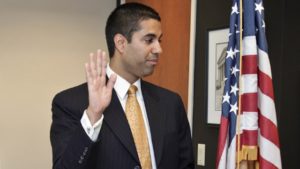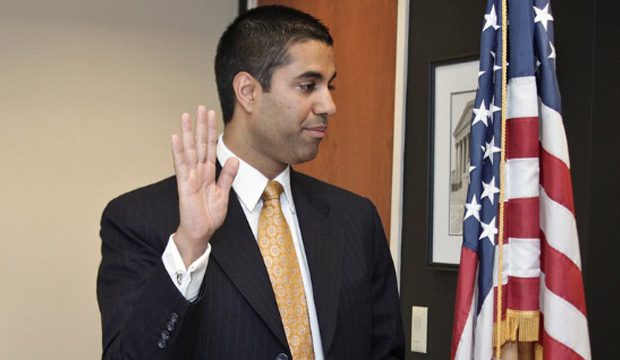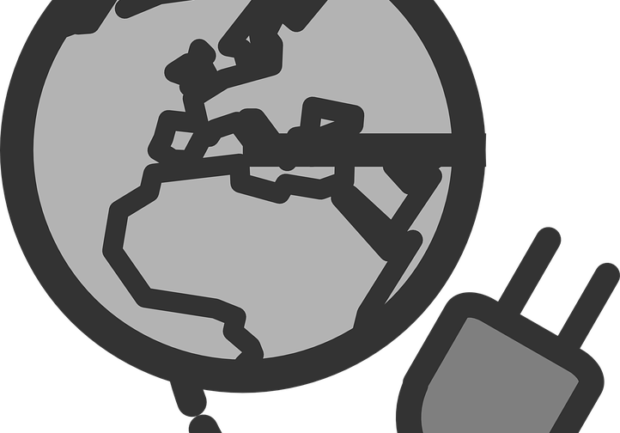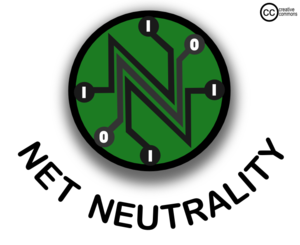 What does a person do when they don’t want to the job they’ve been hired to do? Often times they quit and look for work that might suit them better. Other times they perform their job poorly so that the employer is forced to fire them. But what about the times when firing the individual isn’t really an option? The third instance would be the current case of many of our government officials, but we’re going to look specifically at the latest actions by the FCC Chairman, Ajit Pai.
What does a person do when they don’t want to the job they’ve been hired to do? Often times they quit and look for work that might suit them better. Other times they perform their job poorly so that the employer is forced to fire them. But what about the times when firing the individual isn’t really an option? The third instance would be the current case of many of our government officials, but we’re going to look specifically at the latest actions by the FCC Chairman, Ajit Pai.
The FCC was created to regulate interstate and international communications by radio, television, wire, satellite, and cable in all 50 states, the District of Columbia and U.S. territories, but the actions that Chairman Pai has shown in his first month at the helm of the FCC demonstrates that he is averse to regulating communications of the modern day in any way. In fact, he has openly stated that he’s out to de-regulate ISPs and publically taken credit for the business decisions of mobile service providers attempting to compete for subscribers.
The FCC traditionally has one chairman and four commissioners. Currently, there are only two commissioners and the chairman. The Senate’s decision not to reconfirm a commissioner whose term ended in December 2016 left the deficiency along with the President not having put forth new nominations to fill the vacant seats. Those following the activity of the commission over the last several years would note that the typical voting results was down party lines. Prior to former Chairman Wheeler stepping down there had been three Democrats and two Republicans on the commission. Now there are still the same two Republicans with one Democrat. Just as the Democrats took advantage of their numbers to drive change in the way that communications were being regulated, the Republicans are doing all they can to roll back those regulations.
The Id of Pai
 While attending an international technology conference, Pai made the claim that his decision to abandon the investigations on the effects of zero-rating data by ISPs is what has brought back the return of the unlimited data plans of mobile service providers. The problem with that statement is that it’s inherently untrue. Verizon and AT&T, while being the largest of the mobile service providers, have seen their competition return unlimited data plans as way to draw customers away – and it was working. In order to stay competitive, Verizon and AT&T had to make a business decision that resulted in the return of unlimited data plans. These plans, though, also come with the fine print that states that the providers will slow down the access to data after the customer reaches a certain threshold – a potential violation of the Open Internet Rules if the FCC chooses to enforce them.
While attending an international technology conference, Pai made the claim that his decision to abandon the investigations on the effects of zero-rating data by ISPs is what has brought back the return of the unlimited data plans of mobile service providers. The problem with that statement is that it’s inherently untrue. Verizon and AT&T, while being the largest of the mobile service providers, have seen their competition return unlimited data plans as way to draw customers away – and it was working. In order to stay competitive, Verizon and AT&T had to make a business decision that resulted in the return of unlimited data plans. These plans, though, also come with the fine print that states that the providers will slow down the access to data after the customer reaches a certain threshold – a potential violation of the Open Internet Rules if the FCC chooses to enforce them.
We’re From the FCC and Here to Help
The final major action that the FCC passed in 2016 was a new set of privacy rules for broadband service providers. The reason they did this was due to the loophole that had been created when the FCC had enacted the Open Internet Rules and made ISPs a telecommunications service as opposed to an information service. This change in classification gave the FCC new opportunity to determine how the information passing through the wires, in-state and across state lines, should be handled by the ISPs to protect the consumers.
The rules that were passed required more from the ISPs to protect consumer data than any other internet-based service. Effectively, the ISPs would be required to provide consumers the option to opt out of having their data, including personal information provided when signing up for the service as well as browsing history, tracked, and would require consumers to opt in to allowing the ISPs to share that data with other third party service providers. Additionally, the rules defined how the ISPs were to respond in the event that they were hacked and personal information was accessed.
 The edge service providers, such as Facebook, Netflix, Hulu, Google, and other places that you visit when you’re on the internet are not required to abide by such strict standards. These services aren’t governed by the rules created by the FCC, but rather the rules that are created and enforced by the FTC. Chairman Pai’s dissenting opinion when the rules were passed last fall emphasized the fact that network services should be treated the same. His belief was that having an account with Verizon or Comcast was equivalent to having a Facebook page or Netflix account. The thing is, he’s exceptionally wrong. These services do not equate.
The edge service providers, such as Facebook, Netflix, Hulu, Google, and other places that you visit when you’re on the internet are not required to abide by such strict standards. These services aren’t governed by the rules created by the FCC, but rather the rules that are created and enforced by the FTC. Chairman Pai’s dissenting opinion when the rules were passed last fall emphasized the fact that network services should be treated the same. His belief was that having an account with Verizon or Comcast was equivalent to having a Facebook page or Netflix account. The thing is, he’s exceptionally wrong. These services do not equate.
The Path Is Different Than the Destination
 An ISP provides a consumer the ability to access all information on the network. A consumer, whether they hold an account to a website or not, has to go through the ISPs to access information on the internet. They have to opt in to a service provider just to have internet access. However, once the consumer is online, they have the ability to pick and choose which websites they want to visit and which companies they wish to provide their personal information to when they sign up for a service. The ISP, during all of this activity, has the ability to monitor that data – regardless of what site is being visited. A service that provides the connectivity between you and any location where you choose to access information is not the same thing as the destination you go to get that information. Chairman Pai’s stance, though, is that they are identical and should be regulated by the same rules.
An ISP provides a consumer the ability to access all information on the network. A consumer, whether they hold an account to a website or not, has to go through the ISPs to access information on the internet. They have to opt in to a service provider just to have internet access. However, once the consumer is online, they have the ability to pick and choose which websites they want to visit and which companies they wish to provide their personal information to when they sign up for a service. The ISP, during all of this activity, has the ability to monitor that data – regardless of what site is being visited. A service that provides the connectivity between you and any location where you choose to access information is not the same thing as the destination you go to get that information. Chairman Pai’s stance, though, is that they are identical and should be regulated by the same rules.
The argument provided for these privacy rules in the fall was that telephone services were not allowed to wiretap people’s phones without a warrant. By reclassifying the ISPs to a telecommunications service, and the ISPs being a modern equivalent of early twentieth century telephone lines, the regulations should reflect the fact that they are a service that connects people, not the ultimate destination like an edge service provider.
Why spend so much time revisiting these issues when they were passed in 2016? Because last week, the shorthanded FCC commission voted to prevent these rules that had been approved under the previous commission from taking effect; again straight down party lines 2-1.
Zeros or Heroes?
Our current FCC chairman has made claims that he is out to protect the consumers by not regulating the ISPs use of zero-rating data traffic, which as of right now has not been, nor will be, investigated as to whether it abides by the Open Internet Rules. There are pundits that have stated that this is what the consumers want, but it can easily be argued that 90% or more of consumers have no idea what zero-rating data actually does. But when it comes to protecting consumers’ privacy and data, the FCC has shown itself that business rules the day.
Under the privacy rules as they were approved in 2016, consumers still had the ability to allow ISPs to use their data, but now there is no way to for them to prevent ISPs from selling their data to a third party. While the FTC has historically been the organization that enforced consumer protection, but a court ruling last year has severely handcuffed their ability to protect consumers in the event of a data breach. The ruling stated that emotional harm and causing only a low likelihood of harm to consumers are not sufficient enough for the FTC to step in as the protector of the consumers harmed.
 Chairman Pai has no intention of protecting consumers. His agenda is easily tracked to deregulation so that ISPs have free reign to do what they wish with your information, and then incentivizing them to expand their networks through tax breaks and any other way he can find to offset costs of those expansions because he believes that rules that regulate how the ISPs are required to behave restricts expansion, regardless of whether or not the data about ISP network expansion since the rules governing net neutrality were passed contradicts that very belief.
Chairman Pai has no intention of protecting consumers. His agenda is easily tracked to deregulation so that ISPs have free reign to do what they wish with your information, and then incentivizing them to expand their networks through tax breaks and any other way he can find to offset costs of those expansions because he believes that rules that regulate how the ISPs are required to behave restricts expansion, regardless of whether or not the data about ISP network expansion since the rules governing net neutrality were passed contradicts that very belief.
Now is the time to start learning how to protect yourself online. Suggestions such as not using the ISPs provided cable modem, using VPNs to access the data privately, and encryption for your emails and other communications are only a start, but they will prove to be valuable. As our government chooses not to protect its people, the people will have to learn to protect themselves from their government.






